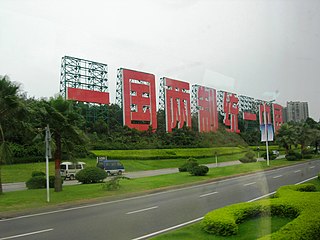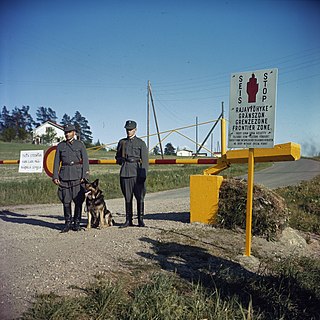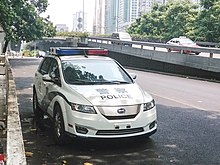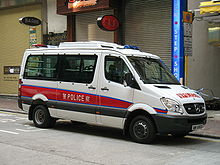
"Mainland China", also referred to as "the Chinese mainland", is a geopolitical term defined as the territory under direct administration of the People's Republic of China (PRC) in the aftermath of the Chinese Civil War. In addition to the geographical mainland, the geopolitical sense of the term includes islands such as Hainan, Chongming, and Zhoushan. By convention, territories outside of mainland China include:

"One country, two systems" is a constitutional principle of the People's Republic of China (PRC) describing the governance of the special administrative regions of Hong Kong and Macau.

The People's Armed Police Force is a Chinese paramilitary organization primarily responsible for internal security, riot control, counter-terrorism, disaster response, law enforcement and maritime rights protection as well as providing support to the People's Liberation Army (PLA) during wartime.

Secret police are police, intelligence, or security agencies that engage in covert operations against a government's political, ideological, or social opponents and dissidents. Secret police organizations are characteristic of authoritarian and totalitarian regimes. They protect the political power of a dictator or regime and often operate outside the law to repress dissidents and weaken political opposition, frequently using violence. They may enjoy legal sanction to hold and charge suspects without ever identifying their organization.

The Ministry of Public Security is a government ministry of the People's Republic of China responsible for public and political security. It oversees more than 1.9 million of the country's law enforcement officers and as such the vast majority of the People's Police. While the MPS is a nationwide police force, conducting counterintelligence and maintaining the political security of the Chinese Communist Party (CCP) remain its core functions.

The Ministry of State Security (MSS) is the principal civilian intelligence and security agency of the People's Republic of China, responsible for foreign intelligence, counterintelligence, and the political security of the Chinese Communist Party (CCP). One of the largest and most secretive intelligence organizations in the world, it maintains powerful branches at the provincial, city, municipality and township levels throughout China. The ministry's headquarters, Yidongyuan, is a large compound in Beijing's Haidian district.
The Law of the People's Republic of China, officially referred to as the socialist rule of law with Chinese characteristics, is the legal regime of China, with the separate legal traditions and systems of mainland China, Hong Kong, and Macau.
The origin of the current law of the People's Republic of China can be traced back to the period of the early 1930s, during the establishment of the Chinese Soviet Republic. In 1931 the first supreme court was established. Though the contemporary legal system and laws have no direct links to traditional Chinese law, their impact and influence of historical norms still exist.
A public security bureau of a city or county, or public security department of a province or autonomous region, in the People's Republic of China refers to a government office essentially acting as a police station or a local or provincial police; the smallest police stations are called police posts.

The government of the People's Republic of China is based on a system of people's congress within the parameters of a unitary communist state, in which the ruling Chinese Communist Party (CCP) enacts its policies through people's congresses. This system is based on the principle of unified state power, in which the legislature, the National People's Congress (NPC), is constitutionally enshrined as "the highest state organ of power." As China's political system has no separation of powers, there is only one branch of government which is represented by the legislature. The CCP through the NPC enacts unified leadership, which requires that all state organs, from the Supreme People's Court to the President of China, are elected by, answerable to, and have no separate powers than those granted to them by the NPC. By law, all elections at all levels must adhere to the leadership of the CCP. The CCP controls appointments in all state bodies through a two-thirds majority in the NPC. The remaining seats are held by nominally independent delegates and eight minor political parties, which are non-oppositional and support the CCP. All government bodies and state-owned enterprises have internal CCP committees that lead the decision-making in these institutions.

A border guard of a country is a national security agency that ensures border security. Some of the national border guard agencies also perform coast guard and rescue service duties.

The Central Political and Legal Affairs Commission (CPLC), commonly referred to as Zhongyang Zhengfawei in Chinese, is the organization under the Central Committee of the Chinese Communist Party (CCP) responsible for "political and legal affairs". Based on the principles of Leninism and democratic centralism, the organization acts as the overseer and coordinator of all legal enforcement authorities, including the Ministries of State Security, Public Security and Justice, as well as the Supreme People's Court and Supreme People's Procuratorate. All provincial, municipal, county and autonomous region CCP committees have their own political and legal affairs commissions.
The national security of China is the coordination of a variety of organizations, including law enforcement, military, paramilitary, governmental, and intelligence agencies that aim to ensure China's national security. China considers three factors in its national security: national sovereignty, security, and development interests.

The Hong Kong and Macao Work Office, concurrently known as the Hong Kong and Macao Affairs Office of the State Council (HMO), is an administrative office of the Central Committee of the Chinese Communist Party responsible for promoting cooperation and coordination of political, economic, and cultural ties between mainland China and the Chinese Special Administrative Regions of Hong Kong and Macau. It was formed in 2023 on the basis of then State Council's HKMAO. Its head office is in Xicheng District, Beijing.

Capital punishment in Macau was formally abolished in 1976 and reiterated in the Penal Code of Macau in 1995.

Mass surveillance in the People's Republic of China (PRC) is the network of monitoring systems used by the Chinese central government to monitor Chinese citizens. It is primarily conducted through the government, although corporate surveillance in connection with the Chinese government has been reported to occur. China monitors its citizens through Internet surveillance, camera surveillance, and through other digital technologies. It has become increasingly widespread and grown in sophistication under General Secretary of the Chinese Communist Party (CCP) Xi Jinping's administration.

Chen Wenqing is a Chinese intelligence officer, politician and member of the Politburo of the Chinese Communist Party who currently serves as the secretary of the Central Political and Legal Affairs Commission. He previously led the Ministry of State Security.

The National Immigration Administration (NIA), alternatively known as the Exit and Entry Administration of the People's Republic of China, is a sub-ministry-level executive agency administrated by the Ministry of Public Security. The administration is responsible for coordinating and formulating immigration policies and their implementation, border control, administering foreigners’ stay, management on refugees and nationality, taking the lead in coordinating the administering of foreigners who illegally enter, stay or are employed in China, and the repatriation of illegal immigrants.

The People's Police is the national civilian police force of the People's Republic of China. Police in China have a variety of roles in addition to enforcing the law, they are also responsible for the maintenance of social stability, and in this sense policing in China performs not just a law enforcement function but a political function as well. The majority of national police forces are under the jurisdiction of the Ministry of Public Security (MPS).

















